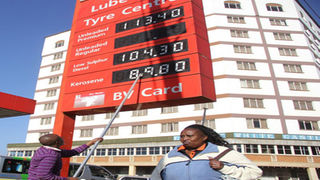
A man adjusts fuel prices downwards on a price board at a petrol station in Eldoret town on September 15, 2014. The Energy Regulatory Commission is on Wednesday expected to announce new fuel prices, with consumers expecting a high reduction as global prices continue on a free fall. PHOTO | JARED NYATAYA |
| FileBusiness
Premium
Bill to slash fuel prices ready
Parliament has published a petroleum products tax amendment bill, setting in motion efforts to lower the prices of fuel when the House resumes its sittings next week.
“The objective of this Bill is to review taxes and levies on petroleum with a view of making the products cheaper. The global prices have been on the rise in the recent months hence to bring the price of fuel down, there is a need to reduce the taxes and levies applicable to petroleum products,” the bill says.
The bill proposes to restructure the Petroleum Development Fund in order to specify under what circumstances the fund can be used by establishing the Petroleum Development Fund Advisory Board.
The board, the bill proposes, will approve withdrawals from the fund and may also impose conditions on the use of any authorised expenditure.
The law guiding the Petroleum Development Levy demands that it support a subsidy when fuel prices shoot up and infrastructure upgrades in the energy and petroleum sectors.
The Petroleum Products (Taxes and Levies) Amendment Bill, 2021 is sponsored by the Finance and Planning Committee, chaired by Homa Bay Woman Representative Gladys Wanga.
In its report, the committee said the Treasury abused the Petroleum Development Fund by supporting payments such as for Standard Gauge Railway (SGR) in breach of the law.
The bill imposes a fine of Sh50,000 or imprisonment for one year or both on any person who fails to comply with provisions of development levy order.
“The bill has been published. It’s awaiting (its) first reading after recess, when it matures,” Ms Wanga told the Nation.
If passed, the bill will affect several tax proposals recommended in a committee report that the House unanimously passed last month.
MPs proposed a reduction in the levy, which is charged at Sh5.4 on petrol and Sh2.9 for diesel, after revoking the Petroleum Development Levy Order, 2020, and amending the Petroleum Development Fund Act, 1991.
Lawmakers also proposed that VAT be cut from eight per cent to four per cent.
VAT on fuel was introduced by the VAT Act of 2013, but its adoption was deferred by three years until 2016. Another two-year extension was given through the 2016 Finance Act. The 2018 Finance Act pegged VAT on fuel at 8 per cent.
MPs also propose slashing the VAT rate on liquefied petroleum gas (LPG) or cooking gas from the current 16 per cent to eight per cent.
Lawmakers also amended the 2019 Petroleum Act by inserting the Third Schedule to the Energy (Petroleum Pricing) Regulations, 2010.





